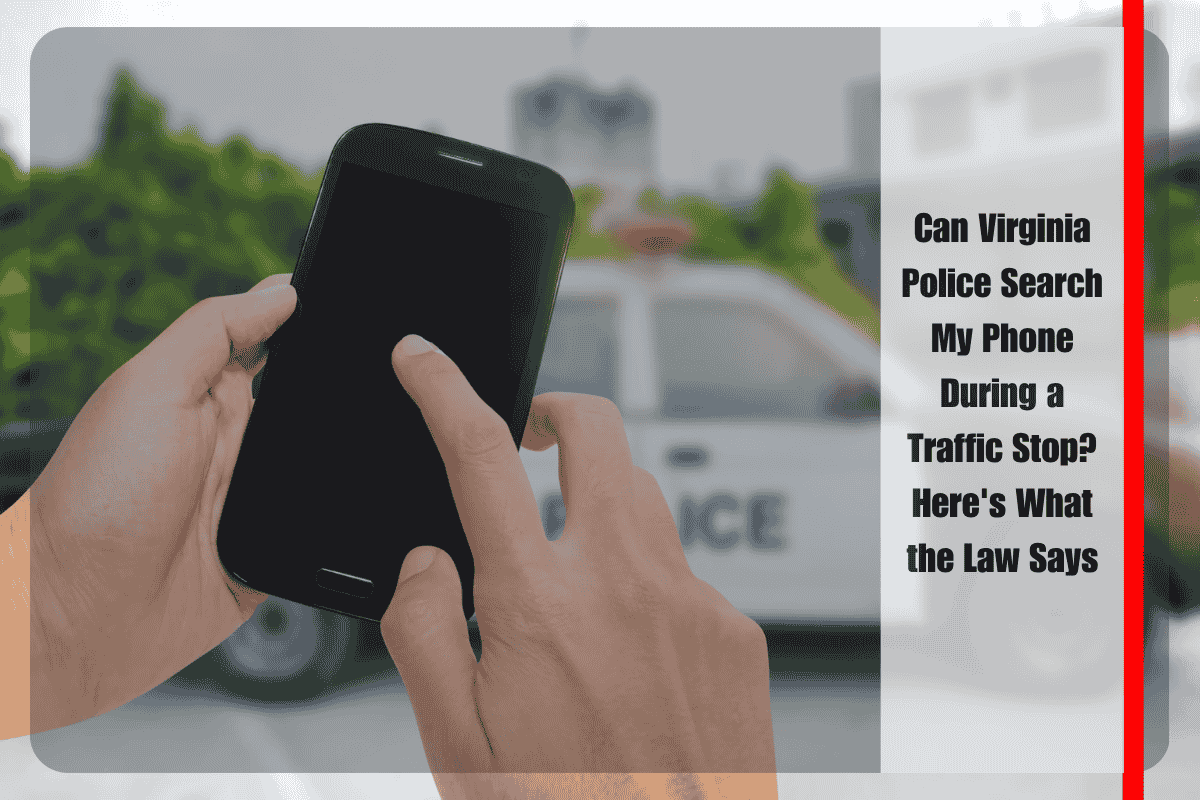If you are pulled over by the police during a traffic stop in Virginia, you might be wondering if the officer can search your phone. With the increasing use of smartphones for almost every aspect of our lives, your phone has become a personal and private device. Understanding your rights in these situations can help protect your privacy. This article explores what the law says about police searching your phone during a traffic stop in Virginia.
The Fourth Amendment and Privacy Rights
The Fourth Amendment of the United States Constitution offers protection against unreasonable searches and seizures, meaning that police generally cannot search your personal belongings, including your phone, without a good reason, such as a warrant or probable cause. However, there are certain exceptions to this rule, especially during traffic stops, which we will explain further.
When Can Police Search Your Phone During a Traffic Stop?
In Virginia, as in most places, the police cannot search your phone during a traffic stop unless there are specific circumstances. Understanding these scenarios can help clarify when police have the right to search your device.
If a police officer asks to search your phone, you have the right to refuse. Consent is a key factor in determining whether a search is legal. If you do not consent to a search, the officer cannot proceed unless they have another legal justification. Keep in mind that your refusal must be clear and unambiguous.
In some situations, if the police have probable cause to believe that your phone contains evidence of a crime, they may be allowed to search it. For example, if an officer suspects that your phone is involved in illegal activities, such as drug trafficking, they may have the grounds to conduct a search without your consent. Probable cause means that the police have enough reason, based on facts or observations, to believe that a crime has been committed or that evidence of a crime is on your phone.
If you are arrested during the traffic stop, Virginia police may have the right to search your phone as part of what is called a “search incident to arrest.” However, this does not give them blanket permission to search your phone. The search must be reasonable and relevant to the reason for your arrest. For instance, the police can search your phone for evidence related to the crime for which you were arrested. However, after a recent U.S. Supreme Court ruling in Riley v. California (2014), police generally need a warrant to search the contents of your phone after an arrest unless there are pressing concerns, such as an immediate threat to officer safety or the destruction of evidence.
Sometimes, police may be allowed to search your phone during a traffic stop if they have safety concerns. For example, if they believe your phone contains information that could harm them or others, they may be permitted to search it. These situations are typically based on exigent circumstances, which allow for immediate action when there is a threat to public safety or the risk of evidence being destroyed.
What the Law Says About Phone Searches in Virginia
Virginia follows federal laws on searches and seizures, and the state’s courts generally uphold the principles set out by the U.S. Supreme Court. Specifically, the Riley v. California decision established that law enforcement must obtain a warrant to search a smartphone, except in exceptional circumstances, such as consent, exigent circumstances, or when the phone is linked to a recent arrest.
Under Virginia law, the police must respect the protections against unreasonable searches, as outlined in the Virginia Constitution. Therefore, unless you give consent or the police have probable cause, or if you are arrested, they generally cannot search your phone during a routine traffic stop.
Can Police Take My Phone During a Traffic Stop?
While the police may not search your phone immediately, they can seize it temporarily if they have reason to believe it holds evidence of a crime. However, taking your phone does not automatically give the police the right to search it. The police would need to obtain a warrant before examining the contents of your phone unless there are urgent circumstances, like the potential for evidence to be destroyed.
What Should You Do if the Police Want to Search Your Phone?
If you’re asked to allow the police to search your phone during a traffic stop, it’s essential to know your rights. First and foremost, you have the right to refuse the search. You can simply tell the officer, “I do not consent to a search of my phone.” It’s important to stay calm and respectful when asserting your rights. Arguing with the officer or being confrontational may escalate the situation unnecessarily.
If you are arrested and the police want to search your phone, you have the right to ask for a lawyer. This is a critical step, as an attorney can help protect your rights and ensure that the search is conducted lawfully.
Your Rights During a Traffic Stop in Virginia
In conclusion, Virginia police generally cannot search your phone during a traffic stop without a valid legal reason. If you are asked to allow a search, you have the right to refuse. However, the police may search your phone if they have probable cause, if you’re arrested, or if there are safety concerns. It’s crucial to know your rights and stay informed to protect your privacy and avoid unnecessary complications during a traffic stop.
Sources
[1] https://www.bigvalleylaw.com/blog/2024/10/do-i-have-to-open-my-cellphone-for-the-police/
[2] https://answers.justia.com/question/2025/03/24/looking-for-case-law-on-using-cell-phone-1054384
[3] https://www.thehealthlawfirm.com/criminal-law-warrantless-search-of-cell-phones/
[4] https://www.acluva.org/press-releases/supreme-court-ruled-police-need-warrant-access-cell-phone-location-history/
[5] https://law.lis.virginia.gov/vacode/title19.2/chapter5/section19.2-59/












